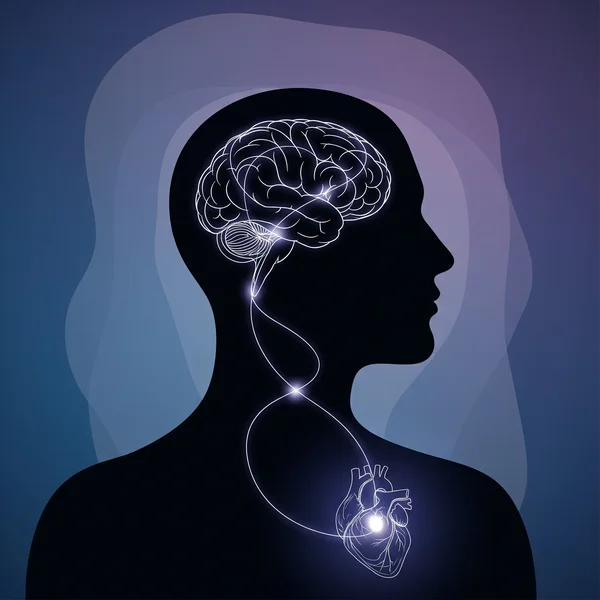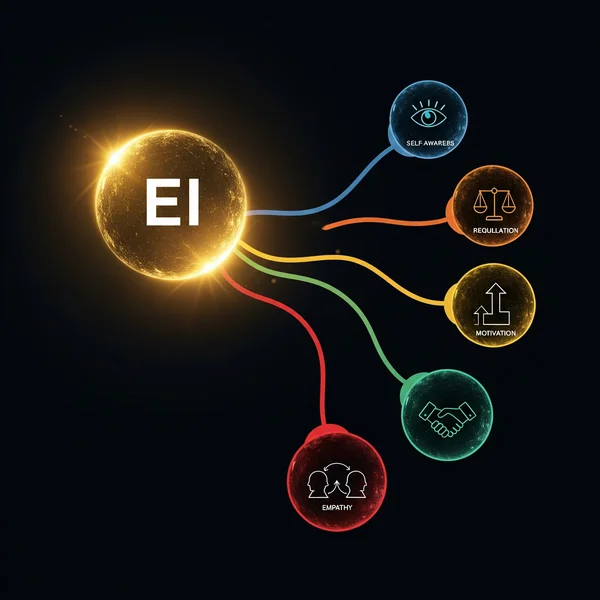What is an EI Test? A Guide to EI Assessment
August 18, 2025 | By Evelyn Reed
Have you ever wondered why some of the most intellectually brilliant people struggle with relationships, or why certain individuals seem to navigate social complexities with effortless grace? The answer often lies beyond IQ, in a realm known as Emotional Intelligence (EI). But what is an EI test, and how can it help you unlock your own potential? This guide will walk you through everything you need to know about this powerful tool for personal growth. If you're ready to begin your journey of self-discovery, you can take our online emotional intelligence test at any time.

What is Emotional Intelligence (EI)? A Simple Definition
Before diving into the test, let's clarify the core concept. Emotional Intelligence (EI), sometimes called Emotional Quotient (EQ), is the ability to perceive, use, understand, manage, and handle emotions. It's about recognizing your own feelings and those of others, using this information to guide your thinking and behavior, managing your emotions to adapt to environments, and achieving your goals. Unlike IQ, which is relatively stable, emotional intelligence is a flexible set of skills that you can learn and improve over time.
So, What is an EI Test, Exactly?
In essence, an EI test is a psychometric tool specifically designed to measure your emotional intelligence. Think of it as a structured self-assessment that presents you with a series of questions or scenarios about how you typically respond to various emotional situations. Your answers help create a profile of your strengths and areas for development across key emotional competencies. This type of evaluation isn't about judging you, but about providing a snapshot of your current abilities to foster greater self-awareness.
The Science Behind EI Tests: Key Theories and Models
A reliable EI assessment isn't just a random quiz; it’s grounded in decades of psychological research. Understanding these models helps you trust the process and the results.
The Ability Model by Salovey and Mayer
Pioneers Peter Salovey and John D. Mayer defined EI as a specific type of intelligence based on abilities. Their model outlines four key skills: perceiving emotions, using emotions to facilitate thought, understanding emotions, and managing emotions. This model views EI as a pure cognitive ability.
The Mixed Model by Daniel Goleman
Author and psychologist Daniel Goleman popularized the concept of emotional intelligence in his 1995 book. His model is a "mixed model" because it includes a broad range of competencies, blending cognitive abilities with personality traits. This is the framework many practical evaluations, including those focused on career development, are based on.

What Exactly Does an EI Test Measure? The 5 Core Dimensions
What does an EI test measure in practical terms? While models vary, most comprehensive tests evaluate five interconnected dimensions of emotional intelligence, a framework popularized by Daniel Goleman. Knowing your scores across these areas can be incredibly insightful for your personal growth.
1. Self-Awareness: Understanding Your Own Emotions
This is the foundation. It's your ability to recognize and understand your own moods, emotions, and drives, as well as their effect on others. Do you know what triggers your frustration? Can you identify when you're feeling anxious, even if you're trying to hide it?
2. Self-Regulation: Managing Your Reactions
This dimension involves controlling or redirecting disruptive impulses and moods. It's the ability to think before you act. High self-regulation means you can stay calm under pressure and manage stress effectively.
3. Motivation: Driving Yourself Towards Goals
This is about a passion for work and life for reasons that go beyond money or status. It includes your inner drive to achieve, your optimism, and your commitment to your goals, even in the face of setbacks.
4. Empathy: Recognizing Emotions in Others
Empathy is the ability to understand the emotional makeup of other people. It's about being able to put yourself in someone else's shoes and sense their feelings. This is a critical component for building strong social skills.
5. Social Skills: Building Meaningful Relationships
This is the culmination of the other dimensions. It's about managing relationships to move people in the desired direction. This includes skills like communication, influence, conflict management, and collaboration. Ready to see how you score on these five dimensions? Discover your profile with our free test.

The Benefits of Taking an Emotional Intelligence Test
Why should you invest 10-15 minutes in an emotional intelligence evaluation? The benefits span across every aspect of your life.
For Personal Growth and Self-Discovery
Such an assessment provides a clear, objective baseline for understanding yourself. It illuminates blind spots and validates your strengths, giving you a concrete roadmap for self-improvement.
For Career Advancement and Leadership
In the workplace, high EI is a strong predictor of success. It's linked to better leadership, teamwork, and negotiation skills. Many companies now use this type of tool for hiring and leadership development.
For Stronger Interpersonal Relationships
By improving your empathy and social skills, you can build deeper, more meaningful connections with friends, family, and partners. Understanding emotions—yours and theirs—is the key to healthier communication.
How to Prepare for an EI Test (And What to Expect)
Preparing for an emotional intelligence test is simpler than for an academic exam.
The Mindset: Honesty is the Best Policy
There are no "right" or "wrong" answers. The goal is to get an accurate picture of yourself. Answer based on how you typically are, not how you wish you were. The more honest you are, the more valuable your results will be.
The Process: What a Typical Online EI Test Looks Like
Most online evaluations consist of multiple-choice questions or statements where you rate how much you agree or disagree. The process is quick, confidential, and you'll usually receive your ei test results instantly upon completion, just like with our science-backed assessment.
Your First Step to a Higher EI Starts Here
Understanding your Emotional Intelligence is not the end goal; it's the beginning of a powerful journey. A quality EI assessment is the map that shows you where you are and where you can go. It empowers you with the self-knowledge needed to navigate life's challenges with greater wisdom, build more resilient relationships, and achieve your fullest potential.
Frequently Asked Questions about EI Tests
What is the difference between an EI test and a personality test (like MBTI)?
This is a great question. A personality test (like MBTI or Big Five) describes your inherent preferences and tendencies—who you are. An EI test measures a set of flexible skills and abilities—what you can do. Your personality might be introverted, but you can still have very high emotional intelligence.
Is there a right or wrong answer on an EI test?
No. The test is a self-assessment tool, not a pass/fail exam. The most "correct" answer is the one that most honestly reflects your typical behavior and feelings. The value comes from the accuracy of your personal report.
How long does it take to get EI test results?
For most online platforms, the process is immediate. As soon as you complete the questions, the system will analyze your answers and generate your personalized ei test scores. You can discover your scores in under 15 minutes with our free test.